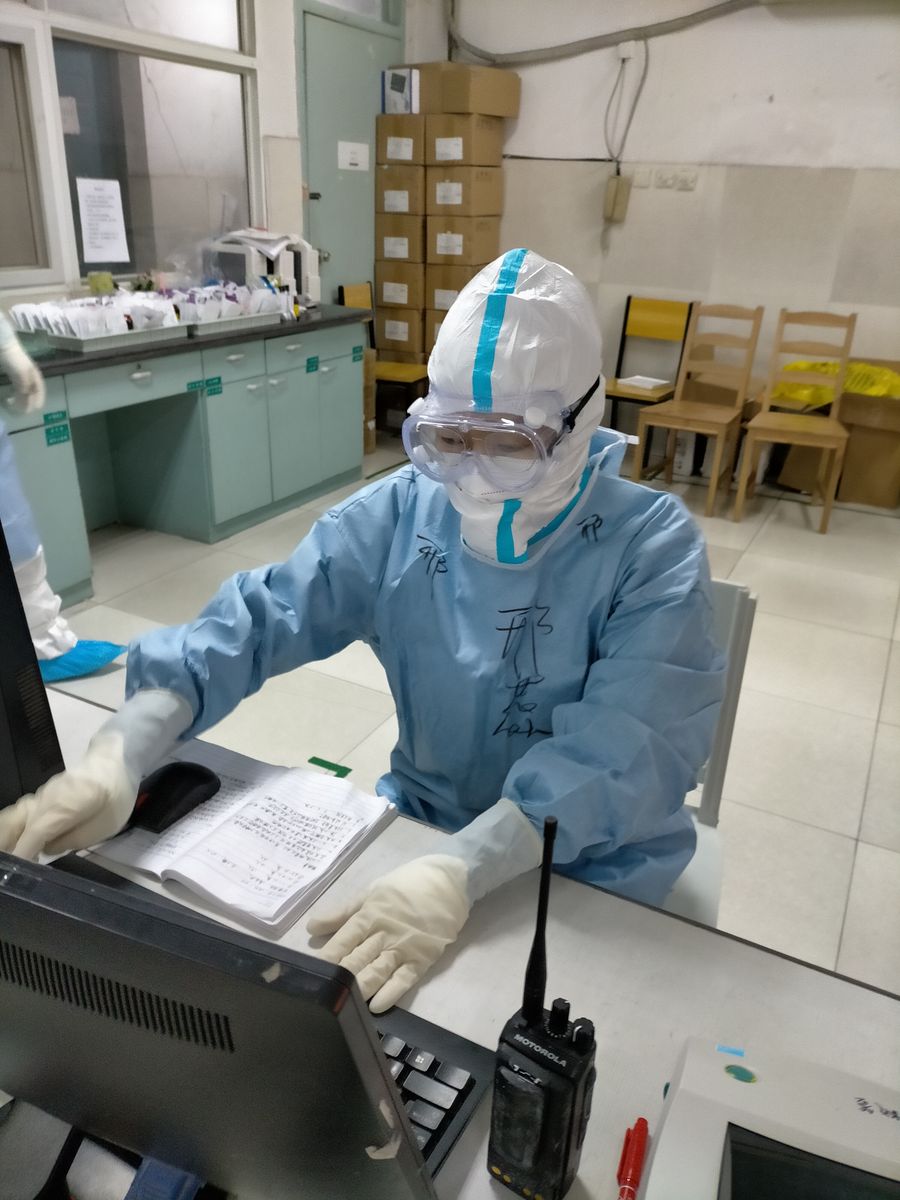Xing Rui is on a ward round at a hospital in Wuhan, central China's Hubei Province, Feb. 25, 2020. (Photo Provided by Xing Rui)
In the hospital, the virus is isolated, but love is not.
TIANJIN, March 5 (Xinhua) -- "Fortieth day in Wuhan, safe and sound!" 34-year-old Xing Rui said in her 40th safety message on her WeChat Moments.
Xing, a nurse from northern China's Tianjin Municipality, was dispatched to Hubei Province, the epicenter of the coronavirus outbreak, on Jan. 26.
Every day after work, she shared slices of her life in Wuhan -- covered under masks, gloves, goggles and protective suits most of the time -- on WeChat. She also posted photos of heart-warming meals prepared by volunteers or letters from and to her daughter.
"Time is tight and tasks tough. I barely had time to check my phone at work. As a result, I have too many messages to reply to. So I came up with the idea of sharing my life on WeChat Moments so that my family and friends can check out what I am doing in Wuhan and most importantly, know that I'm doing OK," Xing said.
Looking through her 40 messages, "success," "beautiful," "spring," were the words that appear most frequently. Xing said she wanted to pass on positive energy to more people both on the frontline and back home. "It would bring more of a sense of stability and sureness."
Wuhan was not a strange city for Xing, who spent four years from 2006 to 2010 studying nursing care at Hubei University of Chinese Medicine. Wuhan is like her second hometown.

Xing Rui is inputting patient information into a computer at a hospital in Wuhan, central China's Hubei Province, Feb. 16, 2020. (Photo Provided by Xing Rui)
"I am destined to protect Wuhan," she said.
On the eve of the Chinese Lunar New Year, a festival for family get-togethers, Xing volunteered to aid Wuhan.
Song Fuxin, her husband, said she could not fall asleep after learning of the epidemic in Wuhan. "She's worried about Wuhan a lot. Our family supported her on the decision."
When the medical team landed at the Wuhan airport two days later, Xing did not feel strange or anxious.
"My teachers and schoolmates in Wuhan are all fighting on the frontline. I hope to join them as soon as possible to fight against the coronavirus," Xing said.
She soon began working in a coronavirus designated hospital. She trudged around in a protective suit and busily shuttled between patients' beds. She checked their names, delivered medicine and asked if they needed anything.
She has four hours of close contact with infected patients during each shift. During the period, she could not drink or eat wearing the thick protective suit, and she even put on a paper diaper because using the toilet was a luxury too.
"As a medical staff, I know how precious the protective gear is at this critical time. I can't allow myself to waste protective suits and must make the fullest use of them," she said.
After wearing the suit for a short time, Xing's clothes would be soaked with sweat, and blood-red marks appear on the bridge of her nose due to wearing her mask tightly.
"Sometimes I would feel dizzy and short of breath. I would only rest for a while before continuing to work," Xing said. She knew she was racing against time. When her patients were out of danger and became well, she felt her efforts were not in vain.
In the hospital, the virus is isolated, but love is not. Some patients volunteered to pick up a broom or mop to do some cleaning. They told Xing that they felt better and hoped to stretch their arms and legs for exercise. The unexpected harmonious doctor-patient relationship warmed Xing.
Xing's 7-year-old daughter wrote her a letter with colorful pictures to express her love.
"I was touched and so happy when I saw the letter. My daughter calls out 'mom' three times before going to bed every night. She hopes to see me at home when she opens her eyes in the morning."
But Xing also knew that her sensible daughter was acting brave. "She understands what I am doing in Wuhan," she said. "As a parent, I must set a good example."
"When disaster fell, help came from all sides. I think she will gradually understand the meaning of it," Xing said.
After a month of work, Xing was given a break. She planned to summarize her work in words for her incoming colleagues.
"I'm confident that all of us will return home as sound as when we came here," Xing said. ■
 简体中文
简体中文

